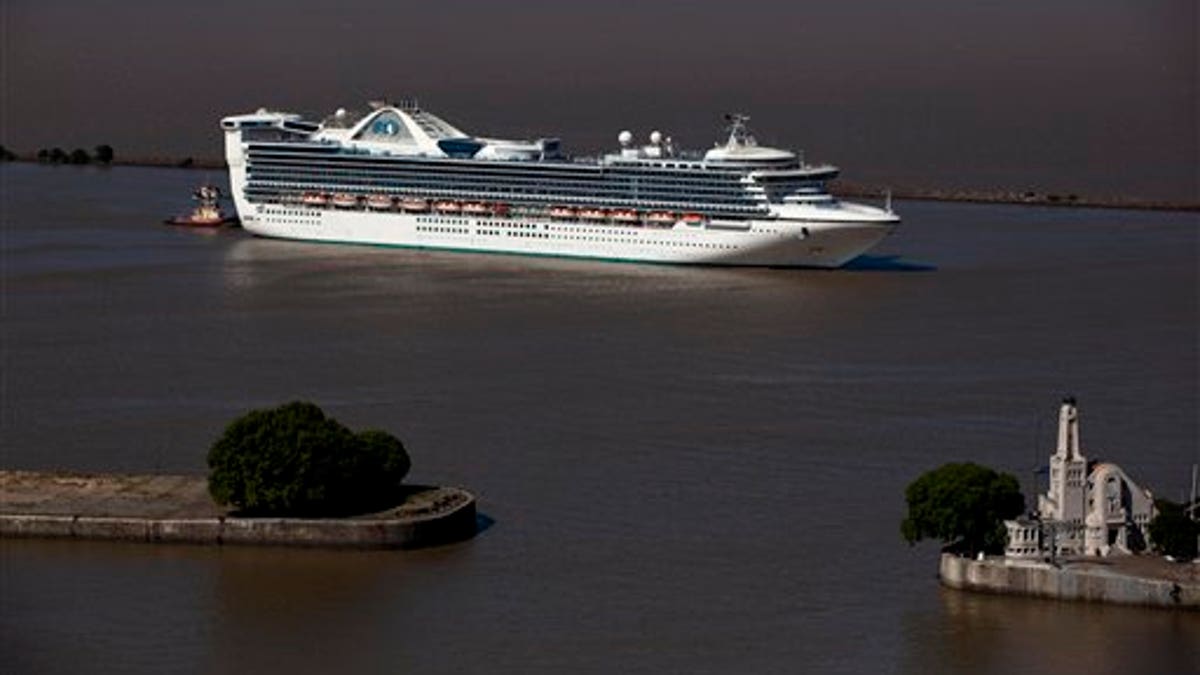
Jan. 17: The Star Princess cruise ship leaves Buenos Aires' port in Argentina. (AP)
BUENOS AIRES, Argentina – The Falkland Islands came under further criticism Tuesday for refusing to allow a cruise ship with an outbreak of stomach flu to dock, as passengers complained about their missed travel plans and an expert called the decision an overreaction.
Tourists on the Star Princess told The Associated Press they were forced to cancel long-planned trips when officials in the disputed British territory off Argentina refused them entry Saturday, saying an outbreak could strain the archipelago's medical resources.
About 74 passengers and crew among the more than 3,500 people on board were reported ill with norovirus, 20 of them with symptoms like vomiting and diarrhea.
Briton John Sturgeon and his wife had been looking forward to the visit as one of the highlights of the South American cruise, saying they wanted to see the islands to remember the upcoming 30th anniversary of Argentina's invasion of the colony. Argentina and Britain continue to be in a diplomatic row over the islands, which Argentina calls the Malvinas.
"I had already booked a tour with someone in the Falklands," he said as the couple disembarked for a stop in Buenos Aires. Sturgeon said the ship's captain considered the refusal to allow them to dock "very unreasonable and unprecedented."
There were also several hundred Argentines among the passengers, who had paid thousands of dollars for the cruise in order to visit the graves of their fathers. A cemetery on the island is filled with the tombs of Argentine draftees killed in the ill-fated 1982 war.
Argentine passenger Liliana Rodriguez said some of the passengers had been planning to pay respects to loved ones buried on the island.
"There was a young guy who brought a shield for the tomb of his father there," Rodriguez said. "There was all of these people and so many more, because we didn't get the chance to have contact with everyone because there were at least 300 Argentines."
The Falklands has defended its decision as being made "in the wider interests of the public and tourism industry," according to a statement from the island's chief medical officer. "An outbreak in the Falkland Islands would put enormous pressure on our limited medical resources and jeopardize other scheduled cruise visits," the statement said.
Norovirus is highly contagious and spreads through the stool or vomit of infected people. The virus can linger on surfaces like door handles, carpets and tabletops. It can also spread when people share the food, drinks or eating utensils of an infected person.
But Norman Noah, an infectious diseases expert at London's School of Hygiene and Tropical Medicine, described the Falklands' decision as "over the top."
He has previously investigated norovirus outbreaks and said the illness normally passes within a couple of days and is unlikely to overwhelm hospitals.
Princess Cruises has called the decision "totally unwarranted."
The virus is the most common cause of gastroenteritis in the U.S. About 1 in 5 of norovirus outbreaks reported to the U.S. Centers for Disease Control and Prevention occurred on cruise ships or in vacation settings. The CDC has documented about a dozen outbreaks a year on cruise ships worldwide.
The U.S. CDC's Vessel Sanitation Program never advises that ships cannot dock, though they might issue a "no sail order" in the case of repeated or large outbreaks with little controls in place. That doesn't seem to be the case with the Star Princess, which according to CDC records, hasn't had a norovirus outbreak since 2003.
Even if the ship had been allowed to dock in the Falklands, experts weren't sure the infected passengers would have spread the virus very far.
According to guidance from Britain's Health Protection Agency, any passengers on board a ship who have norovirus should be isolated in their own cabin until at least 24 hours after their symptoms have passed. There are more stringent recommendations for sick crew members.
The agency does not advise that ships with infected patients be prevented from docking, but says certain measures should be in place when the ship arrives into port, like thoroughly cleaning and disinfecting the vessel before it sails on.
"If you're suffering from vomiting and diarrhea, you probably won't be sightseeing," Noah said. "Chances are you'll be staying in your cabin by yourself."
